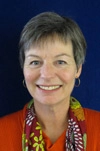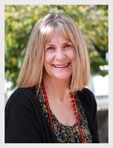Suzanne Trask
Doctoral scholar 2016
 Suzanne's research enquired into issues and opportunities surrounding NCEA Science assessment for New Zealand teachers and learners working in modern learning environments or innovative learning spaces (ILS). The focus for the research originated from an interest in 21st century teaching and learning ideals and from conversations with teachers in ILS about NCEA assessment, combined with an an affinity for classroom interaction/observational research. The working title was Re-positioning teachers and learners for Science assessment in 21st century learning environments. The two-phase research will provide a picture of what is ‘real right now’ as well as look forward to inform future directions for assessment in ILS.
Suzanne's research enquired into issues and opportunities surrounding NCEA Science assessment for New Zealand teachers and learners working in modern learning environments or innovative learning spaces (ILS). The focus for the research originated from an interest in 21st century teaching and learning ideals and from conversations with teachers in ILS about NCEA assessment, combined with an an affinity for classroom interaction/observational research. The working title was Re-positioning teachers and learners for Science assessment in 21st century learning environments. The two-phase research will provide a picture of what is ‘real right now’ as well as look forward to inform future directions for assessment in ILS.
Before taking up the full-time scholarship Suzanne was Teacher Educator and Practicum Co-ordinator for Secondary at Bethlehem Tertiary Institute. Previous roles held included secondary school Science/Chemistry teacher and ESOL teacher.
Suzanne’s supervisors were Professor Bronwen Cowie and Associate Professor Wendy Drewery.
Bryndis Gunnarsdottir
Doctoral scholar 2015
 Bryndis Gunnarsdottir was an early childhood teacher from Iceland. In 2010, she received a two year Erasmus Mundus scholarship from the European Commission and pursued a joint international masters degree in early childhood education and care (IMEC), offered by a consortium of three European universities (Oslo and Akershus University College of Applied Sciences, Norway; Dublin Institute of Technology, Ireland; and the University of Malta). After graduation, Bryndis worked as an early childhood teacher in Oslo, Norway.
Bryndis Gunnarsdottir was an early childhood teacher from Iceland. In 2010, she received a two year Erasmus Mundus scholarship from the European Commission and pursued a joint international masters degree in early childhood education and care (IMEC), offered by a consortium of three European universities (Oslo and Akershus University College of Applied Sciences, Norway; Dublin Institute of Technology, Ireland; and the University of Malta). After graduation, Bryndis worked as an early childhood teacher in Oslo, Norway.
Bryndis´ research interest was with toddlers and their social lives within ECEC. The working title of her research was Toddler friendship in ECEC: The power dynamics of social relationships within a changing construct in sociology of childhood.
Bryndis's supervisors were Associate Professor Sally Peters and Dr. Amanda Bateman.
Angela Webster
Masters scholar 2015
 Angela's thesis Notions and development of privacy in preteens and the relationship to decisions and actions undertaken in an online environment focuses on the preteen 11-13 years, looked at their development and notions of privacy, and how this related to decisions, actions, and knowledge in an online environment regarding personal information. Understanding cyber safety, citizenship and digital media literacies—and how they related to learners and users of all ages—are integral to our society. Angela believed the development and promotion of informed use of digital technologies and behaviours in the virtual environment were implicit in going forward. If we fostered a digital culture and future, then learning and teaching needed to include robust and meaningful exploration of such issues, both at school, and in the home. As this field of study is most fluid at this point in time, Angela wants to participate in sharing, through research, outcomes that might help to inform; shape future policy decisions; initiate new knowledge for learners, teachers, schools, and parents; and influence curriculum development. According to the scholar "Our current Governmental reference for guiding digital or e-Learing in schools, is the e-Learning Planning Framework" (Ministry of Education, 2010). It is a robust document but provides only a framework, with little accountability or support in its implementation, from a policy, regulatory or fiscal perspective. Further research is needed to inform and shape future recommendations and outcomes relating to digital literacies, safety and citizenship for our younger generations of online learners in the New Zealand context."
Angela's thesis Notions and development of privacy in preteens and the relationship to decisions and actions undertaken in an online environment focuses on the preteen 11-13 years, looked at their development and notions of privacy, and how this related to decisions, actions, and knowledge in an online environment regarding personal information. Understanding cyber safety, citizenship and digital media literacies—and how they related to learners and users of all ages—are integral to our society. Angela believed the development and promotion of informed use of digital technologies and behaviours in the virtual environment were implicit in going forward. If we fostered a digital culture and future, then learning and teaching needed to include robust and meaningful exploration of such issues, both at school, and in the home. As this field of study is most fluid at this point in time, Angela wants to participate in sharing, through research, outcomes that might help to inform; shape future policy decisions; initiate new knowledge for learners, teachers, schools, and parents; and influence curriculum development. According to the scholar "Our current Governmental reference for guiding digital or e-Learing in schools, is the e-Learning Planning Framework" (Ministry of Education, 2010). It is a robust document but provides only a framework, with little accountability or support in its implementation, from a policy, regulatory or fiscal perspective. Further research is needed to inform and shape future recommendations and outcomes relating to digital literacies, safety and citizenship for our younger generations of online learners in the New Zealand context."
Angela's supervisor was Garry Falloon.
Judith Graham
Doctoral scholar 2014-2020
 Judith is HOD Guidance at Whakatane High School and is a member of the TLRI funded project Key Competencies: How School Guidance Counsellors contribute to student learning. Her doctoral research proposal has arisen directly out of this project. This research explores how secondary school teachers foster the development of Key Competencies in the hidden learning that occurs in incidental and unplanned moments. It is intended to critique as well as finely describe each competency and its application, particularly in relation to Māori learners. Strategies will be developed that invite teachers to view their interactions with students through the lens of Key Competencies.
Judith is HOD Guidance at Whakatane High School and is a member of the TLRI funded project Key Competencies: How School Guidance Counsellors contribute to student learning. Her doctoral research proposal has arisen directly out of this project. This research explores how secondary school teachers foster the development of Key Competencies in the hidden learning that occurs in incidental and unplanned moments. It is intended to critique as well as finely describe each competency and its application, particularly in relation to Māori learners. Strategies will be developed that invite teachers to view their interactions with students through the lens of Key Competencies.
Judith works as a primary and secondary teacher, and as a counsellor in a Child and Adolescent Mental Health service before returning to the education sector as a Guidance Counsellor.
Bridgette Redder
Masters scholar 2014
 Bridgette Redder completed her Master of Education with First Class Honours in 2014. Her thesis explored infant and peer relationships. Bridgette analysed data for her thesis that was collected for a pilot study project titled Through infant eyes (White, Peter & Redder; and poster). Bridgette was a teacher who enrolled in a PhD programme at the University of Waikato. Her doctoral thesis entitled: A self-study of a teacher’s deeds as answerable acts within infant pedagogy in an early childhood education and care context employed a Bakhtinian dialogic approach to self-study and explored her answerability with infants as a source of research. Bridgette is committed to research and making changes to policy, theory and practice that will benefit all learners. Bridgette has research interests in: subjectivity, morality, answerability, language, communication, relationships, and early years pedagogy.
Bridgette Redder completed her Master of Education with First Class Honours in 2014. Her thesis explored infant and peer relationships. Bridgette analysed data for her thesis that was collected for a pilot study project titled Through infant eyes (White, Peter & Redder; and poster). Bridgette was a teacher who enrolled in a PhD programme at the University of Waikato. Her doctoral thesis entitled: A self-study of a teacher’s deeds as answerable acts within infant pedagogy in an early childhood education and care context employed a Bakhtinian dialogic approach to self-study and explored her answerability with infants as a source of research. Bridgette is committed to research and making changes to policy, theory and practice that will benefit all learners. Bridgette has research interests in: subjectivity, morality, answerability, language, communication, relationships, and early years pedagogy.
Bridgette's Masters supervisors were: E. Jayne White & Mira Peter
Bridgette's PhD supervisors were: E. Jayne White, Carol Murphy & Bronwen Cowie
